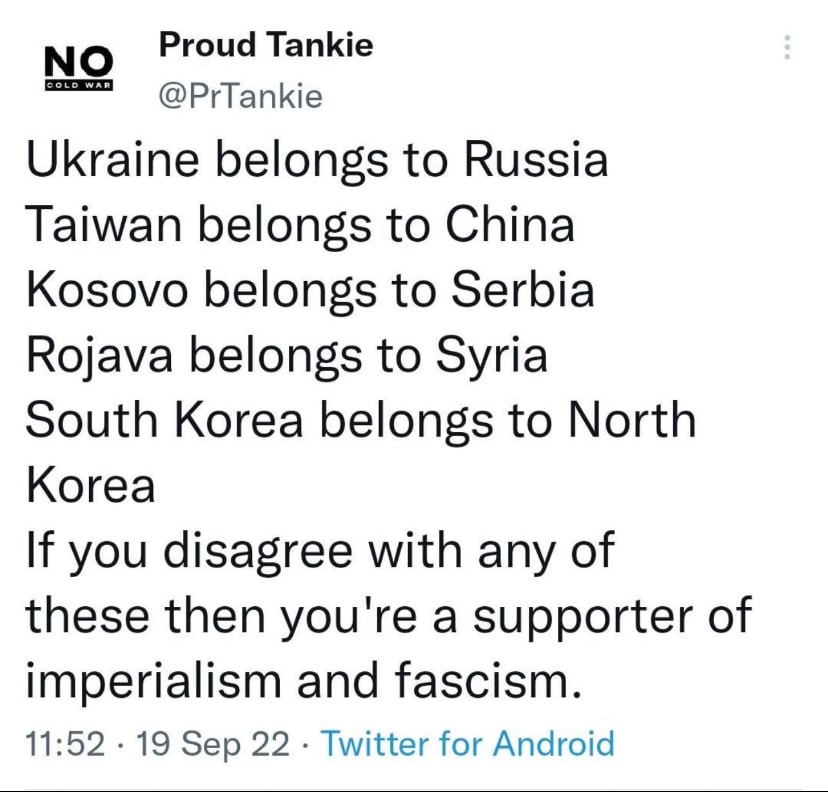this post was submitted on 04 Aug 2024
740 points (91.1% liked)
Facepalm
3292 readers
89 users here now
founded 2 years ago
MODERATORS
you are viewing a single comment's thread
view the rest of the comments
view the rest of the comments

I'm being pedantic because lives are at stake, and recognizing different ideologies is how you learn to combat them.
But if you want to treat it like a joke, go ahead. [edit: redacting petty insult]
I don't think it's accurate to characterize fascism as an ideology, but as a political strategy.
I wonder if it's useful to characterize fascism as a political strategy, as it seems this might ignore the historical conditions which form it and guide it (e.g. returning military, petit-booj resistance to the labor movement to preserve their class interests) and therefore inform us of how other classes will generally act as the labor movement grows.
How would you describe fascism as a political strategy? Does this mean, for example, using scapegoats (like racial minorities and queer folk) as a threat to rally for dictatorial powers?
I absolutely detest this phrase and have a low opinion of anyone who uses it. The entire point of definitions and extrapolations thereof is to be able to make simple models that we can use to understand something. The idea that we always need to keep history in mind is idiotic; there are times when it is an important consideration, and times when it's unnecessary. Simply stating that something ignores certain historical context is not, by itself, a knock-down argument.
The current version of my technical definition of fascism is as such:
"Chauvinism" here-in refers to an irrational belief that one's own identity makes them superior. This definition is inspired by and generalizes Umberto Eco's model. I believe it also encapsulates what people are concerned about when talking about fascism; control and discrimination. If you have suggestions on how to adjust or change the definition, it would be helpful.
I don't believe that fascism can be defined as an ideology, because fascists aren't ideologically coherent. That is to say: different fascist movements are hardly ever compatible, and individual fascists within any particular movement aren't usually consistent with their beliefs; fascists "believe" whatever is convenient at the time.
Edit: forgot to mention that we can factor in history by asking when these strategies tend to be used, how successful they tend to be, and observing if previous groups labeled as fascist used this class of strategy.
It very clearly can't be one coherent ideology, just like liberalism isn't, just like communism isn't. I'm definitely not trying to claim even those individual types (e.g. Italian Fascism, Nazism) are consistent, internally logical, or any of that. Rather, there are common themes, ideas and features which group them together and distinguish them from other ideologies. These groups form a model of relationships between values, ideas and behaviors.
The reason I bring historical circumstance into this is because this model acknowledges attributes like militarism and class collaboration as core components of fascism, with the implied question: why did militarism and class collaborationism take hold in some cases (where a fascist regime rose) and not in others (where it fizzles or is defeated)? Historical factors like World War I and the subsequent wave of communist uprisings are related to why fascist ideologies were developed and were supported by many ex-military and bourgeois. And that is why the conservative racist chauvinism in the neoliberal US and Europe is taking remarkably different shapes to the fascist movements of the 1920s, despite those similarities which guide your definition all being present.
An example of this is neo-Nazi movements like Patriot Front and their international equivalents, which do not receive the blessing of the owning class, which are floundering and failing worse than the British Union of Fascists. There are reasons why they can't replicate the same political strategy and tactics as they did before, and some of those reasons are because we now have different environmental factors. They can't recruit defeated ex-servicemen en masse, so they now primarily recruit vulnerable alienated nerdy teen boys. They can't yet (and often don't want to) earn the blessing of the bourgeoisie at scale because the populations have shifted in a more progressive direction. So then we see neo-Nazi 'Siege' tactics emerge, which are inspired by late-1800s Propaganda of the Deed anarchist tactics, and that is not going well for them either.
Then, we have White Nationalist and/or Christian Nationalists as politicians and billionaires. They often don't want militarism or have military values. They probably don't want class collaboration (because they're winning in the class struggle). So like their goals, their tactics and strategies will overall differ to the fascist movements, despite the shared chauvanism.
I worry that it is too broad, discarding what makes fascist movements unique. I believe the part about violence is ultimately redundant, as I assume systematic chauvinism itself makes individual violence and violent repression likely. The definition, in my view, is really just describing a strategy of using chauvinistic hierarchy, and I don't understand why that is special enough to be called 'fascism', if anything that will just trivialize fascist movements and make the word itself banal, since for example xenophobic chauvinism is a strategy used by almost all governments worldwide, and which does lead to domestic violence.
And what specific thing does it discard that makes them unique?
It is theoretically possible to construct non-violent systematic Chauvinism. For example by employing a condescending delusion of protection or the exaltation of complete non-violence. These would be gross, problematic, and weird but not destructive in the way fascism is.